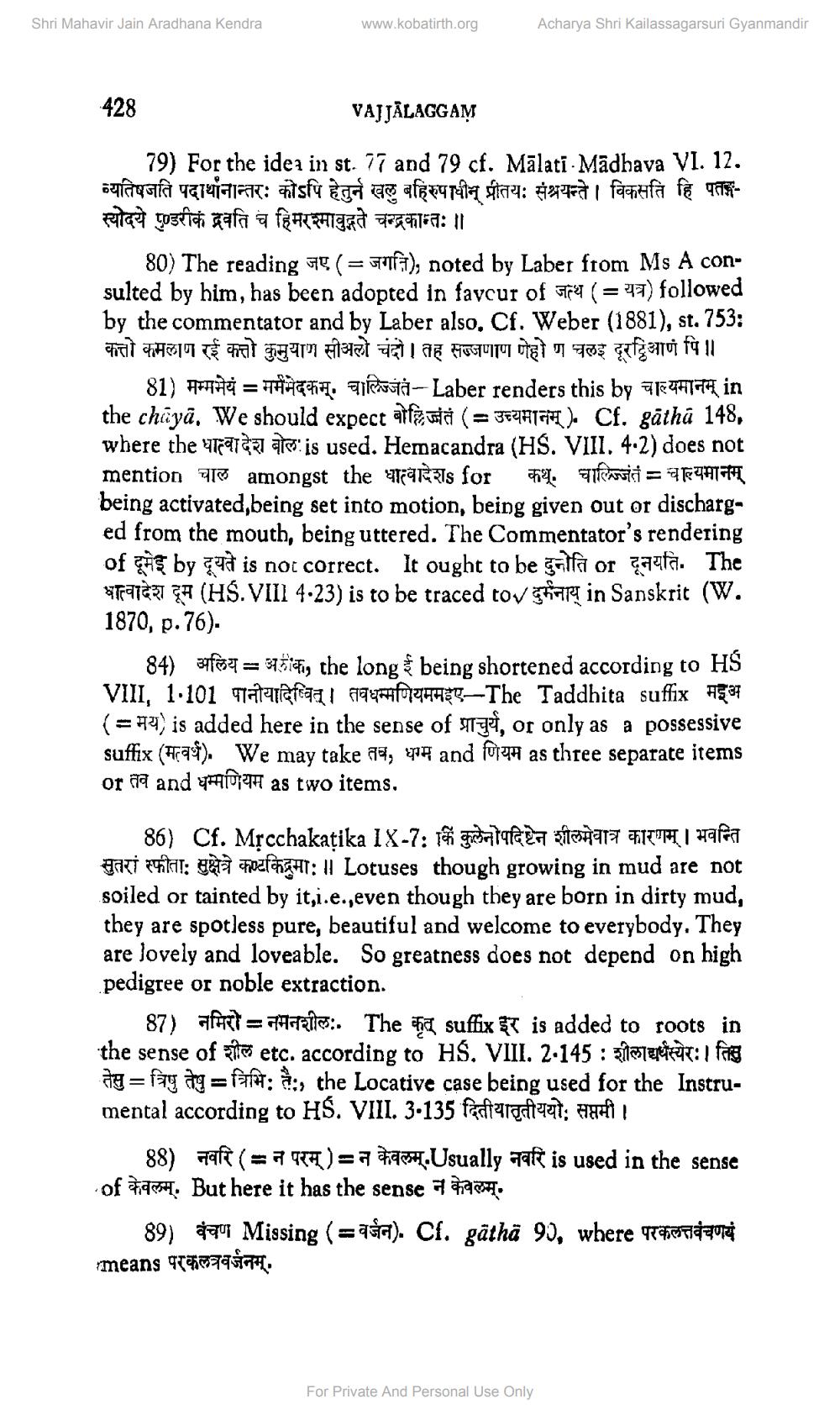________________
Shri Mahavir Jain Aradhana Kendra
www.kobatirth.org
Acharya Shri Kailassagarsuri Gyanmandir
428
VAJJALAGGAM
79) For the idea in st.77 and 79cf. Malati Madhava VI. 12. व्यतिषजति पदार्थानान्तरः कोऽपि हेतुर्न खलु बहिरुपाधीन प्रीतयः संश्रयन्ते । विकसति हि पतङ्गस्योदये पुण्डरीक द्रवति च हिमरश्माबुद्गते चन्द्रकान्तः॥
80) The reading जए ( = जगति), noted by Laber from Ms A consulted by him, has been adopted in favcur of जत्थ ( = यत्र) followed by the commentator and by Laber also. Cf. Weber (1881), st. 753: कत्तो कमलाण रई कत्तो कुमुयाण सीअलो चंदो । तह सज्जणाण णेहो ण चलइ दूरहिआणं पि॥
81) मम्मभेयं = मर्मभेदकम्, चालिज्जतं- Laber renders this by चाल्यमानम् in the chāyā. We should expect allzuia ( = 5EA#1776). Cf. gātha 148, where the धात्वादेश बोलः is used. Hemacandra (HS. VIII.4.2) does not mention चाल amongst the धात्वादेशs for कथः चालिज्जतं = चाल्यमानम् being activated, being set into motion, being given out or discharge ed from the mouth, being uttered. The Commentator's rendering of दूमेइ by दूयते is not correct. It ought to be दुनोति or दूनयति. The धात्वादेश दूम (HS.VIII 4.23) is to be traced tov दुर्मनाय in Sanskrit (W. 1870, p.76).
84) अलिय = अलीक, the long ई being shortened according to HS VIII 1.101 पानीयादिष्वित् । तवधम्मणियममइए-The Taddhita suffix मइम (= मय) is added here in the sense of प्राचुर्य, or only as a possessive suffix (मत्वर्थ). We may take तक, धग्म and णियम as three separate items or तव and धम्मणियम as two items.
86) Cf. Mrcchakatika IX-7: किं कुलेनोपदिष्टेन शीलमेवात्र कारणम् । भवन्ति सुतरां स्फीता: सुक्षेत्रे कण्टकिद्रुमाः ॥ Lotuses though growing in mud are not soiled or tainted by it,i.e., even though they are born in dirty mud, they are spotless pure, beautiful and welcome to everybody. They are lovely and loveable. So greatness does not depend on high pedigree or noble extraction.
__87) नमिरो = नमनशील:. The कृत् suffix इर is added to roots in the sense of शील etc. according to HS. VIII. 2.145 : शीलाद्यर्थस्येरः। तिसु तेसु = त्रिषु तेषु = त्रिभिः तै:, the Locative case being used for the Instrumental according to HS. VIII. 3-135 दितीयातृतीययो: सप्तमी ।
88) नवरि (=न परम् )= न केवलम्.Usually नवरि is used in the sense of केवलम्. But here it has the sense न केवलम्.
89) वंचण Missing (= वर्जन). Cl. gāthā 9, where परकलत्तवणयं rmeans परकलत्रवर्जनम्,
For Private And Personal Use Only




